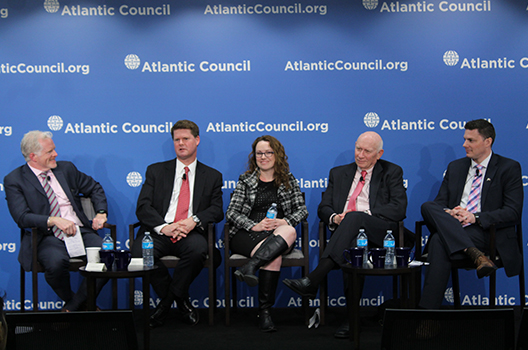 On March 7, the Atlantic Council’s Brent Scowcroft Center on International Security hosted a discussion on the rise of intra-Asian defense cooperation, its significance to regional dynamics, and potential implications to the US and global power dynamics. Recent partnerships range from Japan’s defense cooperation with the Philippines and Vietnam, as well as India-Vietnam, Australia-India-Japan-US, Malaysia-Indonesia-Philippines maritime cooperation, and others.
On March 7, the Atlantic Council’s Brent Scowcroft Center on International Security hosted a discussion on the rise of intra-Asian defense cooperation, its significance to regional dynamics, and potential implications to the US and global power dynamics. Recent partnerships range from Japan’s defense cooperation with the Philippines and Vietnam, as well as India-Vietnam, Australia-India-Japan-US, Malaysia-Indonesia-Philippines maritime cooperation, and others.
Following a warm welcome and introductory remarks by Mr. Barry Pavel, Senior Vice President and Director of the Brent Scowcroft Center on International Security, Mr. Gordon Lubold, Pentagon reporter at The Wall Street Journal moderated the panel on the increase of Asian defense spending and the evolving network of intra-Asian defense coalitions. The panel featured Ms. Lindsey Ford, director of Asian security at the Asia Society Policy Institute; Rear Admiral Michael McDevitt, senior fellow at CNA Strategic Studies; Mr. Randy Schriver, founding partner at Armitage International LLC; and Mr. John Watts, non-resident senior fellow of the Brent Scowcroft Center on International Security at the Atlantic Council.
Mr. Schriver opened the session, focusing on US-Taiwan relations and future plans on defense spending. He argued that while Taiwan has gradually improved cross-strait ties, the country continues to face self-imposed isolation in the region. Taiwan’s partnership with the US has improved and continues to be driven by the Taiwan Relations Act. Henceforth, the United States government has expanded its defense assistance through further arms sales. In past months, a submarine program has been initiated as well as ship visits and dialogue between officers. Schriver further mentioned possible developments on next generation fighters, F-35B.
Ms. Ford continued next, focusing on bilateral partnerships in the Southeast Asian region. She incorporated historic ties into the discussion, pointing to longstanding military disputes and today’s political sensitivities in Southeast Asia. Ford further argued, Asian countries too often show a level of reluctance toward greater intra-Asian cooperation. Historically, governments in the region have sought greater political independence to maintain autonomy. ASEAN was the first successful attempt to promote intergovernmental cooperation and facilitate economic integration amongst its members. She also referred to past intelligence sharing, regional centers for peacekeeping, terrorism deterrence, and possible future military alliances.
Rear Admiral McDevitt initiated a conversation on South Korea and three main challenges the country faces today. First, political dysfunction within the country and the upcoming presidential election at the end of the year. Second, Seoul’s ultimate goal to reunify with the North. South Korea has tried for years to work with China on the underlying issue of North Korea’s missilization. The tensions over the Yellow Sea pose direct threats to the South Korea. Third, McDevitt pointed to “the demons of history”, especially in relation to Japan. The South Korea-Japan relationship is expected to experience further turbulence this year, concerning the comfort women Deal. McDevitt specified, worsening relations will have a negative spillover effect on trilateral cooperation among the United States, South Korea, and Japan, making it more difficult to coordinate policy with regards to North Korea. Japan has been reforming its security policy under Prime Minister Abe, setting defense guidelines in favor of the US; however, political transitions in the United States and South Korea are bringing detrimental changes in power dynamics to the region.
Lastly, John Watts introduced Australia as an important actor to the discussion on intra-Asian cooperation. He emphasized the importance of Asian security to national interest. The country’s prosperity depends largely on trade and investment. Thus, the stability of the Indian and Pacific Ocean are seen as a priority. Australia has been strategically investing in intra- Asian security cooperation initiatives, such as with Indonesia, China, South Korea, and Japan. As Asian states have become wealthier, they have begun to invest more in their armed forces. Australia is key player in this process. In the 2009 Defense White Paper, the government committed itself to long-term increases in military spending and buying offensive weapons. However, Watts stated, Australia has to be careful that its efforts to drive co-operation in Asia will not limit its own policy choices.
Over the past two decades, largely in response to China’s growing economic and military power and doubts about their intentions, we have seen an unprecedented increase in Asian defense spending and an evolving intra-Asian defense cooperation. Questions on the Trump administration and future actions in the Southeast Asian region are still largely unanswered. While Secretary Mattis has recently visited Japan and South Korea, the main conflict areas such as the South China Sea or North Korea’s nuclear threat are still unaddressed. The US has to come to terms that intra-Asian security cooperation has expanded as well as greater defense spending, which will increasingly exclude the United States from the table.
